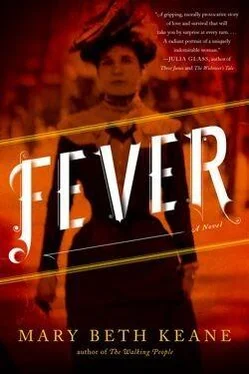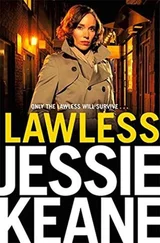“Nothing,” he said. “I can’t get prescriptions from him anymore. A new law.”
Mary frowned. “I don’t understand.”
“Me, neither. He just said there’s a new law, and he can’t write maintenance prescriptions anymore. He said the government is going to check every one he writes now, and if they don’t like what they see they’ll take his license. He said from now on I’m to go downtown to a maintenance clinic on Eighth Street.”
“Well, that’s not so bad.”
“It’s a reduction clinic.”
“What does that mean? Will they give you something or won’t they?”
“They will…” Alfred trailed off. He put his finger to the glass of the window and drew a circle. Next to it he drew a square. “It’s for tapering off. For getting off the medicine entirely.”
“But does it hurt, Alfred? When the medicine wears off?”
He rubbed his arm. “I’m not sure.”
• • •
Toward the end of her life, when Mary had nothing to do except think about the things she’d done when she was still young, especially those months, when she was approaching the end of being young and beginning, finally, to be old, she wondered why she spent so much precious time trying to change things: trying to change herself and Alfred and the way they lived and what they thought and the things they had and the way they spoke to each other and the way they loved each other. Everything. Looking at the back of Alfred’s neck, she wanted him to shake off this news, assure her it would all be fine. She wanted him to forget about his medicine, shave himself, go to work, earn his paycheck, come with her to the market, talk with her. And maybe, it came to her years later, all he’d wanted from her was for her to put her hands on his shoulders, kiss him on the neck, tell him that no matter what, it would all work out in the end.
The clinic had cut him down on his very first visit and wanted him weaned entirely in a matter of six weeks. Mary went with him. It had been nearly two years since Soper had discovered her at the bakery, since she’d fled from the back door. She thought of him less and less as time wore on, and looking back at those years of dreading her check-ins, straining into a pot while a fresh-faced nurse made conversation, she wondered if she’d been insane to comply with all of it. She’d been tired, confused, scared, angry. At the clinic, the young physician ignored Alfred when he told him that it was impossible, that he couldn’t work without his medicine. The physician said that it wasn’t medicine anymore, not since his wounds had healed, that what he was now was a drug addict, not a patient. Alfred’s neck became mottled and angry, he balled his fists, but he didn’t say a word. No, he hadn’t been a patient in years. It wasn’t his fault, the physician admitted, but now that they knew more about all those drugs it was up to Alfred to get himself free of this noose that had been cast around his neck. Mary expected him to argue, to explain that his wounds still hurt at night, that he was in a different category altogether, but Alfred just set his jaw and walked out. When Mary got to the sidewalk, he was gone.
Here is where you should have done better, the distant Mary thought as she looked back on the Mary of this moment. Here is where you should have helped him more, used all that strength inside you to shield him from whatever it was he feared. The price of the drugs had increased with the new law, and later, when Alfred told her that he wouldn’t do it, he just couldn’t do it, it was selfishness that kept her silent. She liked this Alfred. They hadn’t fought in nearly two years. They sat at the table together for three meals a day and if he nodded off, occasionally, while she was talking to him, if he spent mornings staring out the window at the empty sidewalk across the street, it seemed a small price to pay for peace.
He told her that there were other places to buy the drugs. It would cost more, especially now, but it was the way things had to be. No way, Mary should have said. And to make her point, like she would have in the old days, she should have thrown what was left of his drugs in the fire and walked out. Instead she only nodded. “Where?”
The following morning, when he woke up before she did and pulled on a clean undershirt, she didn’t ask where he was going, or what time he’d be home.
Staying silent didn’t do her any good anyway. The peace of that time was ruined despite her decision not to stand up to him. Destroyed. Heroin was cheaper than morphine now, not as closely regulated, and he’d heard about a doctor on East Ninetieth Street who was quick to prescribe heroin for serious respiratory ailments. “Do you suffer from any respiratory ailments, Mr. Briehof?” the doctor asked when Alfred went to meet with him, his thumb fluttering the pages of his prescription pad. Alfred paid the man, and from the first instant he inhaled it he could tell it wasn’t quite the same as what he’d gotten before. Morphine, too. Everything was being cut, mixed with milk sugar, baking soda. Even the laudanum was being diluted with alcohol, table syrup, juice. He measured his own dosages but it was no good. Sometimes he slept whole days away, but there was no peace in sleep anymore. He tossed and raked at his pillow, and when Mary went to him she often found he’d soaked their sheets even though she’d as likely find him shivering, clutching himself like a child. He shit himself and even when he was drinking he had the basic human sense to apologize for something so filthy. Now he shit himself and said nothing and just tried to move away from it. People who came with their arms full of laundry stopped at their threshold, drew in their breath, said they’d come back another time. The Teamsters wrote a letter to say that they could not reinstate his membership until he paid back dues.
Here is where she should have left. And here again. And if not there, then here. Here. He would have snapped out of it if she’d left, would have paid attention, but still, she stayed, and tried to make more money, and whatever she made she handed to him. The laws got stricter and the drugs got more expensive every month.
When a neighbor on the fourth floor came home from the hospital, Mary distracted herself by bringing up a quiche and a loaf of freshly baked raisin bread. When the woman was strong enough to make her way downstairs, she stopped at Mary’s door to thank her, ask if she could make another one of those quiches for a friend. “I’ll pay you, of course,” she said, and something switched on in Mary. “Sure,” she responded, and named her price, almost as much as half a day of taking in laundry. One quiche. And instead of balking, the woman seemed grateful, told Mary it was her quiche that had given her strength.
She no longer had any fear that Soper was hiding around every corner, spying on her through a crack in the door. She imagined baking out of their small oven, lining up what she made on the sill. She let it be known that she could cook and deliver dishes, and it went around that she had a talent for it. She stopped taking in laundry, and once, when Alfred was feeling well enough to keep her company in the kitchen, and cheerful enough to talk, he came up behind her and whispered that nowhere in the world was cozier than their tiny rooms when she had butter melting in a pan, when she tossed in a handful of chopped onion, diced carrots.
One evening he came home with a black eye and a busted lip, then was bad for days after that, wretching into bowls and eventually knocking over the bowls when he thrashed. Mary put on her best dress and went to see Dr. Tropp, intent on making him write a prescription like he had so many times before, but when she got to the office his sign was gone, the door locked. She went to the druggist, and he said it was impossible. His license would be taken away. There was a register now, and men came around to check his orders. The only thing for it was to go to the maintenance clinic, and when Mary explained that he’d already been, the druggist shrugged.
Читать дальше












